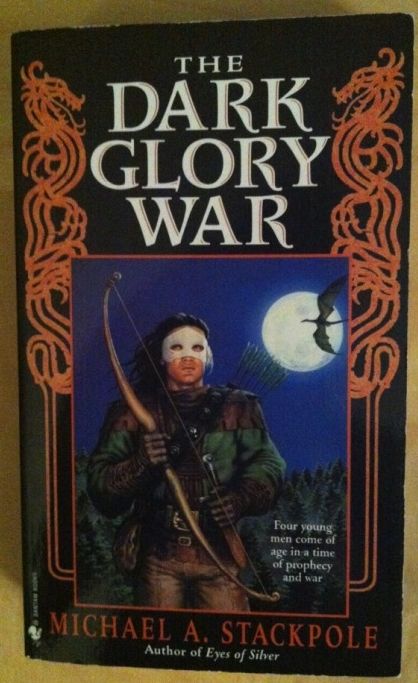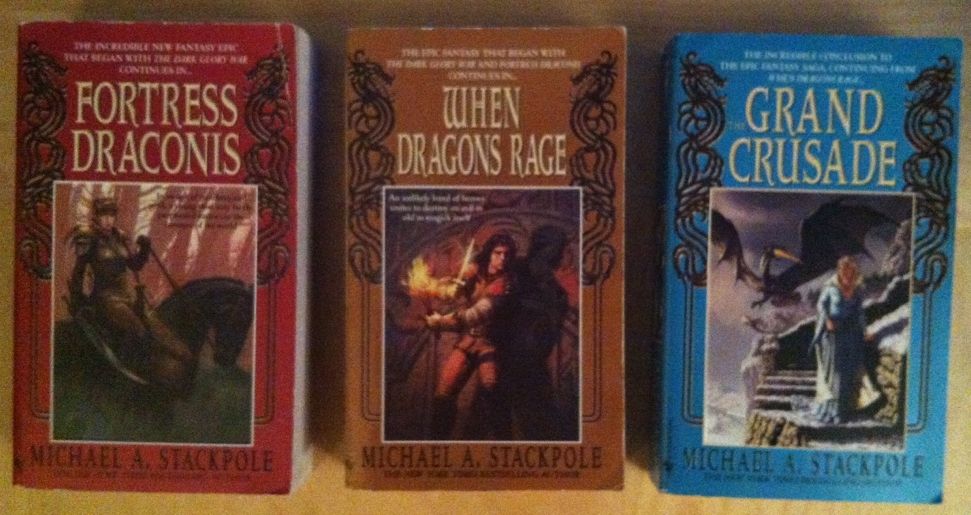When I was in highschool I love (LOVED!) pulp fantasy novels. That mix of romance, swash-buckling adventure, and the certainty of morally valiant heroics was exactly what the introverted, naive, geek I once was wanted. However, as I grew up and gained some experience, perspective, and some (limited) taste in literature, I came to learn that these novels were not just unrealistic but untrue and poorly written. So these days I tend to be very cautious about Fantasy novels.
The Dragon Crown War Cycle, by Michael A Stackpole, is one of my most nostalgia-laced youthful favourites. It's a series of books I liked so much when I read them at the ages 14-17 that they survived the Great Cull of the Paperbacks when I moved out from my Parent's house.
I recently decided to reread them and found that they exemplify everything I used to love about the Fantasy genre but that they also showcase exactly why I read so few Fantasy novels these days.
The Dragon Crown War Cycle starts with The Dark Glory War which is both a stand alone novel and world building primer for the series. In this book a young Tarrant Hawkins, in the month of his coming of age, finds his life suddenly derailed as he is conscripted into a war with the evil Empress-Sorcerer Chytrine of the frozen kingdom of Aurolan and her invading bestial hordes. With the aide of his lord, friends, legendary heroes, and the united armies of the south, Hawkins tries to save the world from invasion and to keep Chytrine from reclaiming the scattered fragments of The Dragoncrown, an artifact which would allow her to command an army of dragons.
These novels certainly stimulated my nostalgia gland. I was instantly reminded of teenage me and the enjoyment I originally experienced reading these novels. The sense of romance, the adventure, the epic scope, the certainty of principle... it's all there! Men are men! Heroes are heroes! And courage, a moral code, and faith in your self and your comrades is all you need to succeed. And all of the action and strength of arms and complex strategy. Basically, the Dragon Crown War Cycle is incredibly satisfying coming of age story that I read when I felt I was coming of age and reading it as an adult is a delightful trip back in time.
However, this is also one of the key problems with the Dragon Crown War Cycle: fourteen yearold me was naive as hell. While the simple, absolute world portrayed in these novels fit with my youthful expectations, some adult experience and perspective shreds this kind of Fantasy. Reality is clearly not governed by moral absolutes and is instead, in most cases, dictated by a more complex, grey morality. And portraying the world as black and white, good and evil, just seems inauthentic now. Sadly, this sense isn't limited to moral absolutism. The Dragon Crown War Cycle has a tendency to make characters' behaviour secondary to the plot, which makes them do a number of bizarre and inauthentic things. Add to that a landslide of deus ex machinas and the most hilariously lyrical and metaphorical approach to writing sex I've encountered outside of poetry read at my Catholic Highschool and things feel not-so-true to life. I guess what I'm trying to say is that divorced of nostalgia these novels do not hold up so well.
The Dragon Crown War Cycle also suffers from having some wickedly problematic politics. These novels are very clearly written for a default audience of teenage white boys, and as a result is nearly Victorian in their portrayal of women and non-white characters. Of the four main point of view characters three are male, and while the one female protagonist has her shit together more than her colleagues, she is constantly being sexualized. There is nary a mention of her intelligence or skill or courage that isn't immediately followed by some male character commenting on how attractive she is. It's messed up. Moreover, I can't escape the impression that her role in the story is less as a hero unto herself and more of an example of the kind of woman a young man should favor and earn by following the code of behaviour presented in the novel. The portrayal of non-white characters is even worse. All of the humans portrayed in the novel are ersatz European and white. But this maybe can be excused by geography and historical precedent... maybe... But against this there is a race called the Panqui, kind of lion/dragon/bears that are portrayed as "Noble Savages" and whose main representative is named "Lombo" and the parallels between the portrayal of the "Noble Savage" in Victorian literature (and "Zambo" the black character in Arthur Conan Doyles The Lost World in particular) is frankly disgusting. In hindsight, The Dragon Crown War Cycle can at times feel like its author read a bunch of Victorian adventure serials and decided to replicate them down to the horrific worldview.
But that might be assigning malice where omission and bad judgement might be more likely.
So would I recommend these books? That's tough. The series clearly has problems, but I can't quite ignore how much I enjoyed these novels as a youth. For adults, I would say that unless you are a giant Fantasy fan who likes the more formulaic epic seams of the genre I wouldn't recommend this book. Joe Abercrombie's novels are much more mature, complex, and authentic examples of Epic Fantasy that I would recommend instead. However, if you are a young reader (or know one) I think I can recommend these books, particularly if you are in the default audience. These books are fun, accessible, and speak to a youth audience in a way that a lot of "adult" fiction doesn't. Moreover, given the issues with literacy among boys, I think there is value in books that play to their interests, even martial ones. These are the kinds of books that kept me hooked on reading as I transitioned into more adult reading habits. That said, I think that if you are giving these books to a younger family member, a discussion about how these books treat women and non-white characters is probably warranted. But yeah, based on how much I enjoyed these books as a youth, I think I can recommend them to those readers.


All True. Read them with the same mindset just as you did as a kid (38 now). And I'm black too.
ReplyDeleteThanks.
Thanks. Isn't a bummer when old favourites fail to live up? I've had a few teen favs really let me down in the last couple years.
Delete